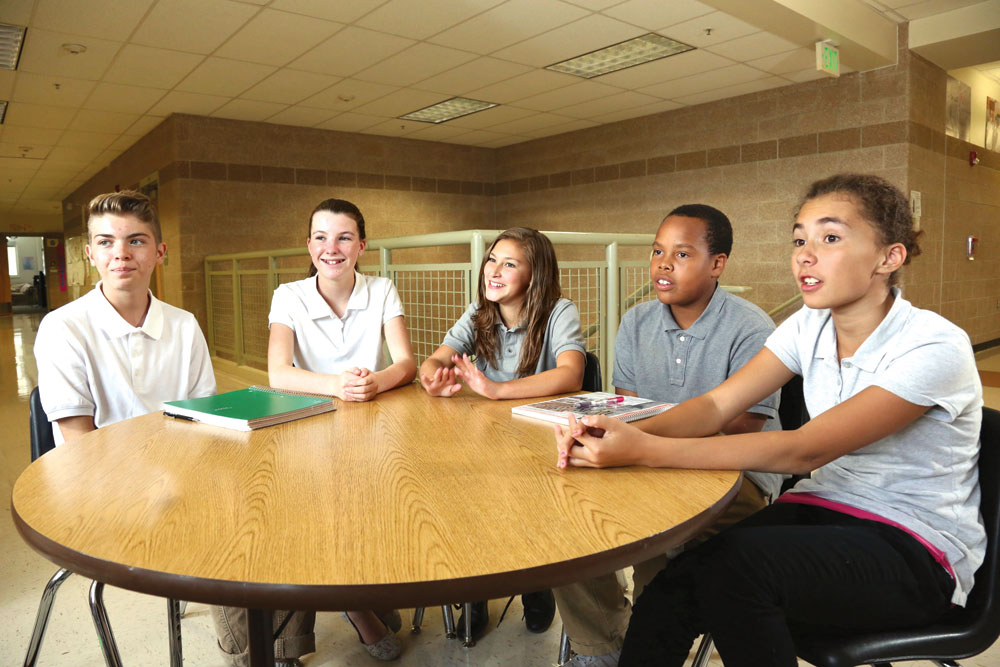
When 12-year-old Isabel Beckler was asked to go to the movies with a friend, she looked at the calendar on her iPhone and found an open date three months away. She created an event and set a reminder. When the date rolled around, the friend was too busy to see the movie. This is typical for Beckler’s social life.
Faced with increasingly busy schedules, 12- to 14-year-olds experience a different adolescence than any generation before. They no longer have to balance just school, but sports, music lessons, homework, and if possible, time with friends.

Bill Roberts K-8 students discuss the challenges and benefits of their busy lives. Left to right Tristan Cordova, Claire Bovard, Isabel Beckler, Garrison Clayton, and Sienna Adams.
“Sometimes I’m so busy I forget to eat,” says Beckler, who takes acting, piano and singing lessons. From morning until night, she is constantly doing something.
A group of five middle school students from Bill Roberts K-8 describe their days. They each wake up at 6am, start school at 8am, finish at 3:15pm and begin activities around 3:30pm. Garrison Clayton, 13, has to be outside and running for sports by 3:20. When asked how it’s possible to be ready in 5 minutes, he’s not sure.
Activities run until mid-evening. At this time they start homework or babysit, then dinner, and on some days more homework until 9:30 or 10pm. They each go to bed at about 11 to average 6–7 hours of sleep and then do it all again.
“Right now I get so stressed when I’m tired and start yelling at people. I don’t mean to. I feel like in high school I’m going to be grumpy all the time,” 12-year-old Sienna Adams says. With dance and sports, her weekdays are nonstop and she feels bad she doesn’t see her parents more.
Each of the students depends on their phone to keep track of their schedules (writing in a planner is apparently out of date). At night they usually remind their parents of the next day’s schedule. Clayton doesn’t deny his exceptional time management skills. “I’m really good at knowing when I do and don’t need to plan more things at one time.”
While they do get stressed, the middle-schoolers like being busy and disregard their parents’ suggestions for more free time.
“My parents say that my schedule is so busy it’s okay if one day I want to take a break,” says Claire Bavard, 12. She thinks she’d be more stressed with nothing to do.
“If I don’t have something to do I’m usually sitting on the couch and eating and thinking, ‘What am I doing?’ But then I remember I was busy all week so it’s fine, but I feel like it’s not okay.” All four other students in the group agree with this.
Relaxing can be difficult. Perhaps their parents would say differently, but they claim they don’t watch TV or lie around the house much. “When I’m sitting around on the weekend and don’t have homework, I’m sitting there thinking, ‘I have homework, I have homework, what do I have to do? What do I have to do? And I’m freaking out,” Sienna Adams says, covering her face with her hands.
The group says they’d feel lazy if they weren’t busy because everyone has busy schedules at their age, except for that token friend who doesn’t have back-to-back activities. This friend unsuccessfully tries to hang out with people.
But what happens to that friend? Are the minority of kids without scheduled lives affected later in life? Do they lack organizational skills of their scheduling-savvy peers? Do they have any friends to hang out with? Comments welcome online or sent to Madeline@FrontPorchStapleton.com.


Does anyone else find this article disturbing? It makes me sad to hear that kids think that having nothing to do is stressful or that relaxing is difficult. Unstructured downtime (in addition to plenty of sleep) is important to a child’s mental and physical health (adults as well…). It’s during downtime that our brains process and make sense of all the information, stimulation and activity we encounter throughout the day. Unstructured time is not only crucial for consolidating learning but also for developing creativity and executive functioning.
The article ends with questions about what might be lacking for the kids who aren’t “scheduling-savvy” (over-scheduled?). Maybe those kids won’t be burned out before they finish high school because they’ve been getting enough sleep and have learned how to balance working hard with being a kid.